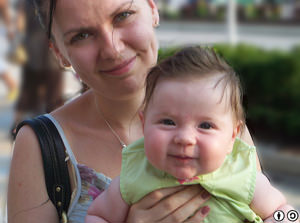Are We Wired for Compassion?
When the term human nature gets thrown around, it's sometimes used in a derisive fashion, as if to boil all the complex motivations, biological drives and psychological quirks that comprise our makeup down to some simplistic, base formula However, there are some who might cast the concept in a brighter light (continued).
When the term human nature gets thrown around, it’s sometimes used in a derisive fashion, as if to boil all the complex motivations, biological drives and psychological quirks that comprise our makeup down to some simplistic, base formula. However, there are some who might cast the concept in a brighter light, including the psychologists and neurologists whose research on compassion is featured in this excerpt from Greater Good Magazine. — KA
Your support matters…Greater Good Magazine via Arts & Letters Daily:
First consider the recent study of the biological basis of compassion. If such a basis exists, we should be wired up, so to speak, to respond to others in need. Recent evidence supports this point convincingly. University of Wisconsin psychologist Jack Nitschke found in an experiment that when mothers looked at pictures of their babies, they not only reported feeling more compassionate love than when they saw other babies; they also demonstrated unique activity in a region of their brains associated with the positive emotions. Nitschke’s finding suggests that this region of the brain is attuned to the first objects of our compassion—our offspring.
But this compassionate instinct isn’t limited to parents’ brains. In a different set of studies, Joshua Greene and Jonathan Cohen of Princeton University found that when subjects contemplated harm being done to others, a similar network of regions in their brains lit up. Our children and victims of violence—two very different subjects, yet united by the similar neurological reactions they provoke. This consistency strongly suggests that compassion isn”t simply a fickle or irrational emotion, but rather an innate human response embedded into the folds of our brains.
In other research by Emory University neuroscientists James Rilling and Gregory Berns, participants were given the chance to help someone else while their brain activity was recorded. Helping others triggered activity in the caudate nucleus and anterior cingulate, portions of the brain that turn on when people receive rewards or experience pleasure. This is a rather remarkable finding: helping others brings the same pleasure we get from the gratification of personal desire.
The brain, then, seems wired up to respond to others’ suffering—indeed, it makes us feel good when we can alleviate that suffering. But do other parts of the body also suggest a biological basis for compassion?
Independent journalism is under threat and overshadowed by heavily funded mainstream media.
You can help level the playing field. Become a member.
Your tax-deductible contribution keeps us digging beneath the headlines to give you thought-provoking, investigative reporting and analysis that unearths what's really happening- without compromise.
Give today to support our courageous, independent journalists.






You need to be a supporter to comment.
There are currently no responses to this article.
Be the first to respond.